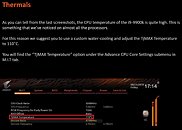Monday, October 15th 2018

GIGABYTE Z390 OC Guide Suggests Intel 9000 Series Processors Will Run Hot Even With Custom Watercooling
It seems that by the time NDA drops on Intel's latest and greatest mainstream processor platform, we will have known more about it than ever before with similar launches. GIGABYTE joined the club with the release of their Z390 overclocking (OC) guide specific to their AORUS-branded motherboards. This contains a lot of useful information in general, and we certainly recommend taking a look at it in the source linked in the full post. As it is, a few items in the guide caught our eye- in particular, a direct quote saying "As you can tell from the last screenshots, the CPU temperature of the i9-9900k is quite high. This is something that we've noticed on almost all the processors. For this reason we suggest you to use a custom water-cooling and adjust the TjMAX Temperature to 110°C."
The quote references their guide to achieve a stable 5 GHz overclock on all cores on the Core i9-9900K, which was cooled via a custom watercooled setup and a Vcore ranging from 1.3-1.4 V. GIGABYTE's internal testing thus indicates that these higher end, unlocked 9000-series CPUs will run incredibly hot if you wish to push them, and the soldered IHS may not be as effective in cooling these dense processors as we may have hoped. Indeed, with news of the 28-core Xeon using thermal paste for the IHS, it appears that Intel may be conflicted on optimal cooling when battling the Core Wars with AMD.
Source:
Gigabyte Z390 OC Guide
The quote references their guide to achieve a stable 5 GHz overclock on all cores on the Core i9-9900K, which was cooled via a custom watercooled setup and a Vcore ranging from 1.3-1.4 V. GIGABYTE's internal testing thus indicates that these higher end, unlocked 9000-series CPUs will run incredibly hot if you wish to push them, and the soldered IHS may not be as effective in cooling these dense processors as we may have hoped. Indeed, with news of the 28-core Xeon using thermal paste for the IHS, it appears that Intel may be conflicted on optimal cooling when battling the Core Wars with AMD.


45 Comments on GIGABYTE Z390 OC Guide Suggests Intel 9000 Series Processors Will Run Hot Even With Custom Watercooling
ASRock over Asus though and I think ASRock and Gigabyte are the top two but Asus wins it in the absolute premium boards
9900K first mainstream high-end processor where it's recommended you have a custom water loop if you plan to overclock it. Crazy.
Just for at refference and yes i know its long from the same CPU or arkitekture. But stll, my own old I7 980X @ 4.43 GHz feed with 1.41 volt to the cores and only air cooled (Noctua NH-D14 with 3 120 fans mounted) the hottest core gets 81 degrees celsius at peak full load and my CPU is even 130 watt TPD out of box and based on much older 32 NM. I9 9900K is only 95 TDP out of box and based on 14 NM + custom water loop and Arent lower NM CPU´s suppose to run cooler than CPU made on older and bigger NM die. Yet the darn thing still runs way hotter even with much lower voltage at 1.3 volts according to the readings in the software in the screenshot and a custom water loop it gets up to 96 degrees celsius on the hotest core. Intel you can do it better than this, if you wanted to:kookoo:
Temp on my CPU to compare.
Size - that cpu has 1366 pins vs the lga 1151 - I've owned a z170 and multiple x58 boards - the size difference is pretty large meaning heat becomes confined easier, your also forgetting this is a 8c16t processor at 5ghz - so crazy power usage is normal and high heat output, but yes. The thermals aren't great at all - but that was a ES processor used the finalized one would be better.
Amd is thermal-balancing their chips by placing multiple dies on one package. This distributes the heat even better on IHS'es compared to intel.
Seriously, why do people think these new 8 cores run hot? Solder makes a huge difference in the 4.8+ GHz range temp wise.
All this 7nm Ryzen talk, haha. It's not even close and people expect way too much.
Intel give 193A for maximum current and that is NOT for sustained run.
They should use more real world test. P95 26.6 1344K or ASUS realbench is very good test. No overkill current and temperature. Also great for reflecting real world heavy programs.